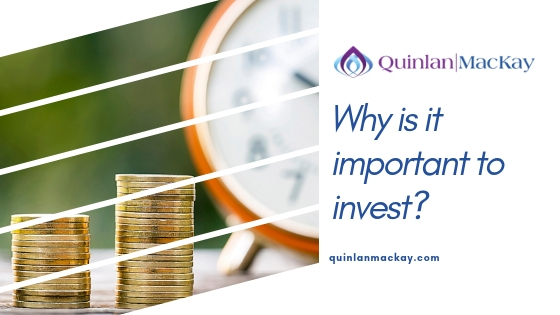
You have probably heard it multiple times from a variety of sources: you need to invest.
But why is it important to invest?
Let’s first consider the impact of not investing. Many think keeping their money in the bank or under a mattress provides security. However, it is merely an illusion of security because the money is earning little to no interest. Furthermore, when the interest earned is less than inflation, many do not realize this actually means their savings are potentially losing value. So, for those not wanting the value of their money to decrease, it is important they consider investing.
Investing also provides opportunities to grow an investor’s money. The growth or interest on an investment is where real financial security comes into play. When an investor’s money grows, they are then able to meet their financial goals sooner, adapt to potential economy changes easier and pursue more endeavors with the additional cash.
Purchasing power and inflation
Investing helps you combat inflation in the long run by preparing your financial security, but you have to ensure that the return rate of an investment is higher than inflation. Without earning more money with your investments as time goes on, inflation decreases your purchasing power.
What is purchasing power?
Purchasing power is the value of money in terms of how many products or services that money can buy. With inflation, the value of money decreases because the overall cost of almost everything within the economy increases. For example, the same $3.50 that buys a gallon of milk today won’t be able to pay for the $4 gallon of milk next year. For this reason, it’s important to monitor inflation in regards to your investment returns. Your financial adviser can help you with this, too, to ensure you’re not losing purchasing power.
Pursue your financial goals
What is the purpose of investing?
Investing primarily serves the purpose of building wealth to create long-term financial security. If you’re at the beginning or middle of your career, you probably want to save for retirement. If you’re toward the end of your career or already enjoying retirement, you probably want to earn passive income to cushion your retirement years. Wherever you are at in your investing journey, investing can help you pursue your financial goals, such as:
- Save for retirement
- Set aside money for or pay for education, which can mean private school or college education for yourself, children or grandchildren
- Save for recreational activities, such as a special vacation or new vehicle
- Create a family legacy for your children and grandchildren
The importance of compound interest
Investing is a long-term process. Short-term projects can be beneficial, but long-term investments that reinvest earned money along the way offer you more bang for your buck because of compound interest.
Compound interest is interest on interest. When you invest money, you earn interest on that money. As your investment total grows, you earn interest on the interest you’ve previously made, which compounds the total investment.
For example, 20-year-old Jennifer starts investing with $1,000 plus $100 per month for 25 years. With 10% interest, she has $128,851.18 total after 25 years. With a total investment of $31,000 over the course of 25 years, she earned over $97,000 in compound interest because time was on her side. This small investment grew immensely.
Jennifer’s mother, Jaclyn, starts investing five years later after seeing her daughter’s investment grow. Since she is 50 by then, she decides to invest more so she can retire at 60. She starts investing with $5,000 plus $500 per month. Ten years later, with the same 10% interest, Jaclyn has $108,593.26 total. With a total investment of $65,000 over the course of 10 years, she earned over $43,000 in compound interest. Because she had half the amount of time as her daughter did to earn compound interest, she spent twice as much and gained almost half as much compound interest.
Not to worry, Jaclyn still has time to invest throughout her retirement years. This is also where a diversified portfolio of investments comes in handy. Having a mixture of short- and long-term investment options will help Jaclyn save more money for her retirement and be able to save some money to leave for Jennifer, too.
Hope for every investor at any age
Regardless of your age, take stock of your financial goals and meet with a financial adviser to start creating a plan to meet those goals today. Don’t forget to take advantage of the compound interest you can earn and manage your purchasing power by monitoring inflation.
The key to investing is starting now. If you’re an accredited investor and would like to discuss investing in real estate, learn more about our investment opportunities.
